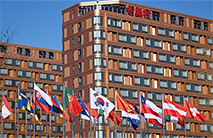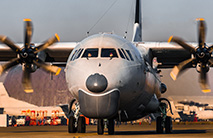Feature: Angels on snow - skiing doctors at Winter Olympics
BEIJING, Jan. 30 (Xinhua) -- On the Olympic alpine skiing tracks in north Beijing, a team of skiers whizzed by, among whom was Bai Peng.
Bai has practised so many times that he knows each twist and turn. He is well prepared for the 2022 Beijing Olympic Winter Games, which starts on February 4.
But he is not an athlete.
In fact, the man wearing an orange vest outside his ski gear is an anesthetist with Peking University Third Hospital, a member of the Olympic medical service team this year to ensure the safety of all athletes.
"We have spent the past three years preparing for the Olympics," Bai said. "When I close my eyes, I can picture each track and each turn. We have envisaged every situation that we might come across, and we have improved our technique. We are ready."
Bai loves winter sports and has been skiing for more than a decade. He has a level-two certificate from the Canadian Ski Instructors' Alliance for leaders in ski teaching, as well as a Chinese ski teaching certificate.
However, when he arrived at the National Alpine Skiing Center, he was astonished by the challenging tracks.
"The slopes are steeper than those of the ordinary ski resorts," he said. "Besides, the Olympic Alpine skiing tracks are icier and it would be hard to reach the injured athletes safely before stopping immediately."
In Alpine skiing, athletes can travel as fast as 140 kilometers per hour. If accidents happen, their injuries could be severe, sometimes fatal.
Therefore, more than 40 medical staff, dubbed the "skiing doctors", work at the Olympic skiing venues to provide medical treatment within four minutes. Sometimes they have to ski carrying equipment that could weigh up to 15 kilograms.
The temperature at Alpine skiing venues is very low, usually at minus 10 to 20 degrees Celsius.
"As we have to take off our gloves when examining the injured, our hands would become numb in a minute. This is also a big challenge for skiing doctors," said Bai, who is among the five skiing doctors from Peking University Third Hospital, which has sent a 200-strong medical service team to Beijing 2022.
All five are members of the hospital's skiing society, which was founded in 2016.
According to Zhou Fang, acting director of the Yanqing branch of Peking University Third Hospital, at that time, when China just won the bid to host the Winter Olympics, there were only about 10 doctors in his hospital who could ski.
"We have worked for the 2008 Summer Olympics and some other big events," he said. "And we were thinking that for the Winter Olympics, you need to be able to ski first before providing medical treatment."
Thus, he decided to create a society to popularize skiing so that doctors could learn how to perform medical procedures on snow.
"In terms of first aid and skiing doctors, there used to be a void in our country," he said. "After the Winter Olympics, our staff will have a better understanding of the treatment of skiers' injuries, and hopefully we can provide better medical services for those who love skiing."
His view was shared by Bai.
"China has committed to engage 300 million people in winter sports, and our job is to ensure that they do so safely," Bai said. "It takes only one or two minutes for us to be able to reach the injured skiers, and that really makes a big difference."
Photos
Related Stories
- Tanzanian President Hassan commends China for hosting Beijing 2022 Winter Olympic Games
- Ireland sends first luge athlete, a doctor, to Beijing Winter Olympics
- Beijing Winter Olympics: training sessions
- Chinese skeleton athlete Geng rueful over Olympic exclusion
- U.S. star skater Nathan Chen excited for Beijing 2022
Copyright © 2022 People's Daily Online. All Rights Reserved.










